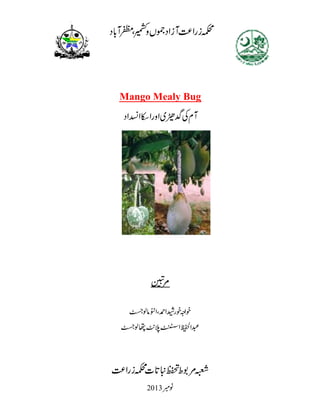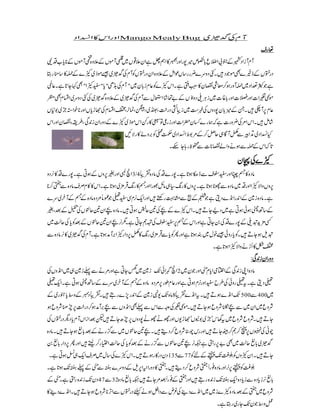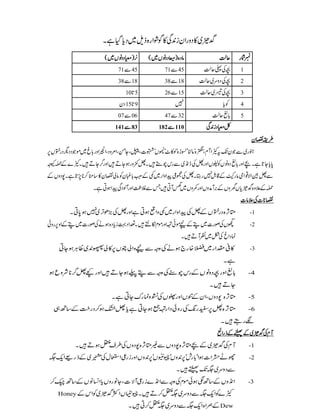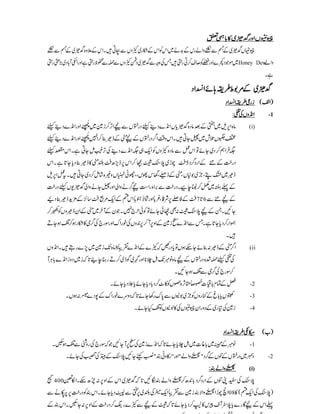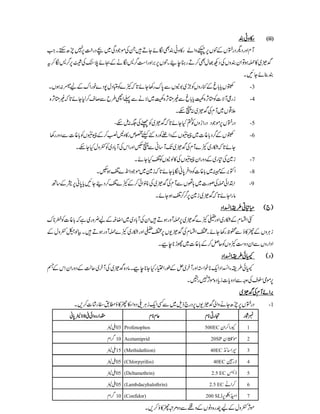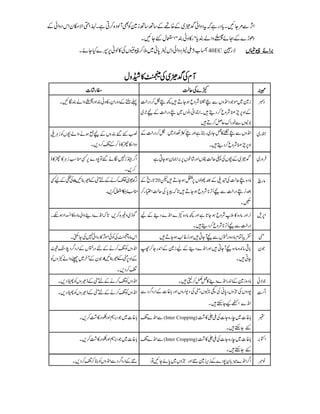Mango mealy bug booklet
- 2. ?????????? Mango Mealy Bug ?????? ??? ??????????????????????????????????????????????????????? ????????????????????????????????????????????????????????? ????????? " ??? "??" ?????? " ????????????????????????????????????????? ????????????????????????????????????????????????????????????? ???????????????????????????????????????????????????????????????? ??????????????????????????????????????????????????????????????? ????????????????????????????????????? ?? ??????????????????????? ????? ????????????????????????? 3/4 ?????????????????????????????? ?????????????????????????????????????????????????????????????????????????? ????????????????????????????????????????????????????????????? ????????????????????????? ?????? ???????????????????? ???????????????????????????????????????????????????????? ????????????????????????????????????????????????????????????????????? ???????????????? ?????????? ??????????????????????????????? 2 ???????????????????????? ??????????????????????????????????????????????????????????? ????????????????????????????????? 8 ????????????????? 500?400? ????????????????????????????????????????????????????????? ?????????????????????????????????????????????????????????????? ?????????????????????????????????????????????????????? ??????????????????????????????????????????????????????????? ????????????????????????????? 135?77 ??????????????????? ???????????????????????????????????????????????????????? ?????????????? 47?32 ????????????????????????????????????????????????? ???????????????????????????????????????????????????????? ??????????????
- 3. ????????????????????????????? ?????????? ??????????? ??? ??? 71?45 71?45 ?????? 1 38?18 38?18 ????????? 2 10??5 26?15 ??????? 3 ?? 15??9 ? ??? 4 07?06 47?32 ?????? 5 141?83 182?110 ??????? ???? ????????????????????????????????????????????????????????????????? ?????????????????????????????????????????????????????????????? ??????????????????????????????????????????????????????????? ???????????????????????????????????????????????? ???????? ????????????????????????????????????????? -1 ??????????????????????????????????????????????? -2 ???????????? ???????????????????????????????????? -3 ?? ??????????????????????????????????????? -4 ???? ????????????????? ???????? ???? -5 ?????????????????????????????????????? -6 ????? ?????? ??????? ?????????????????????????????????? -1 ????????????????????????????????????????????? ?? ?????????? -2 ??????????? ????????????????????????????????????????????? -3 Honey ??????????????????????????????? ??????????????????? Dew
- 4. ?????????????? ????????????????????????????????????????????????????? ?????????????????????????????????????????????????????? Honey Dew ??? ?? ??????????????? ????????? ???? ???????? -1 ?????????????????????????????????????? ????? ?? ? ??????????? (i) ????????????????????????????????? ????? ?? ? ??????????? ?????????????????????????????????????????????? ??????????????????????????????????? 5 ????????????? ??????????????????????????????????????????????? ????????????????????????????????????????????????? ???????????????????????????????????????????? 7??6 ???? ????????????????????????????????????????? ?????????????????????????????????????????????????????????? ?? ??????????????????? 8 ?????????????????????????????? (ii ????????????????????????????????????????????????????? ?????????????? ????????????????????????????????????? -2 ???????????????????????????????????????????????? -3 ?????????????????????????? -4 ???????? ??? ?????????????????????????????????????????????? -1 ?????????????? " ????? " ??? " ??? ?" ?????????????? -2 ?????? (i) ? 400 ???????????????????????????????????????????????? ???? ? ?? ??????????????????????????????????????????????? 08 ?????????? ??????????????????????????????????????????????????????
- 5. ????? (ii) ?????????????????????????????????????????????????????? ?????????????????????????????????????????????????????????? ?????? ??????????????????????????????????????????????????? -3 ???????????????????????????????????????????????? -4 ?????????????? - ?????????????????????????????????? -5 ??????????????????????????????????????????????? -6 ??????????????????????????????????????????? ?????????????????????????? -7 ????????????????????????????????????????? -8 ????????????????????????????????????????????? -9 ??????????????????????? ????????? ??? ??????????????????????????????????????????????????????? ????????????????????????????????????????????????????? ????????????????????????????????? ???????? ??? ?????????????????????????????????????????????????????????????? ???????????????????????????? ?????????? ????????????????????????????????????????????????????? -1 ???? 10 ???????? ????? ?????? ??? ?? 03 Profenophos 500EC ?????? 1 ???? 10 Acetamiprid 20SP ?????? ??? 2 ?? 15 (Methidathion) 40EC ????? 3 ?? 05 (Chlorpyrifos) 40EC ??? 4 ?? 05 (Deltamethrin) 2.5 EC ?? 5 ?? 05 (Lambdacyhalothrin) 2.5 EC ??? 6 ???? 10 (Confidor) 200 SL ??????? 7 ????????????????????????????
- 6. ???????????????????????????????????????????????????????????? ??????? " ????? " ?????????????? ?????????????????????????????? 5 ?? 40EC ??? ???????? ???????????? ????? ?????? ? ???????????????????????? ?????????????????????????????? ?????????????????????????????????? ????????????? ?? ????????????????????? ??????????????? ?????????????????????????????????????? ??????????????? ??? ?????????????????????????? ??? ??????????????????????????????? ????? ????????????????????????? ????????????? ????? 20 ??????????????????????? ???????????????????????????????????? ?? ??? ??????????????????????????????? ???????????????????????????????????? ??????????????????? ???? ?????????????????????? ????????????????????????????? ? ?????????????????????????? ???????????????? ????????? ????? ????? ???????????????????????????????????? ???? ?? ?????????????????????? ??????????????????????? ??? ?????????????????????? ??????????????????????????????????????????? ???????????? ?? ?????????????????????? ?????? (Inter Cropping) ???????????????? ????? ? ? ?????????????????????? ?????? (Inter Cropping) ???????????????? ????? ? ???? ?????????????????????? ???????????????????????????????????? ??

